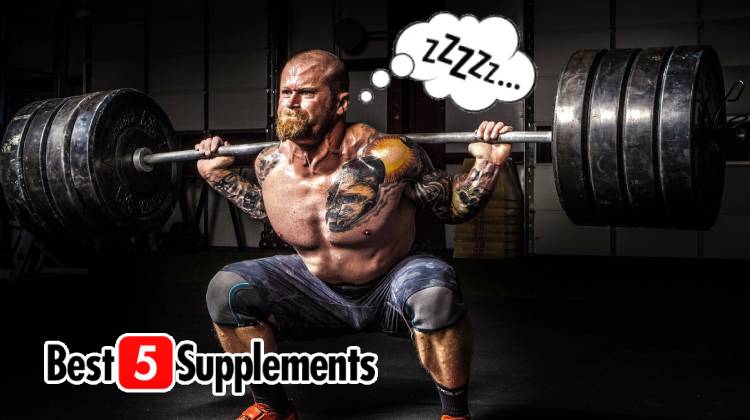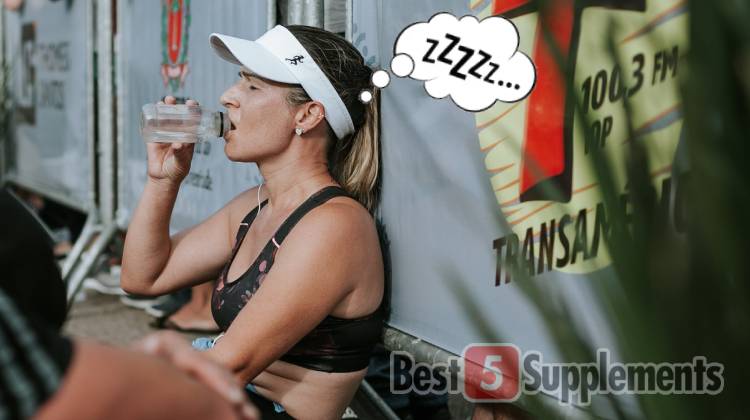
You’re eating right, putting in the hours lifting in the gym, chugging down the protein powders and/ or creatine and BCAAs, but you aren’t making as many strides to your new, better physique as you’d hoped. You’re at a loss to explain why.
We might have the answer: you may not be getting enough sleep. In America, we’re frequently told that diet and exercise are important, but the third pillar of true health – sleep – is often overlooked.
As a result, the busier we get, the more we sacrifice our Zzzs. BUT, not getting enough sleep can undo all the good you’ve done elsewhere in your training regime. Yes, it really is that important.
Sleep impacts our mental, physical and emotional wellbeing. Lack of sleep can lead to poor concentration, memory, reasoning, irritability, and poorer results in productivity and at work, home, play… and at the gym.
Chronic sleep deprivation can lead to headaches, depression and potential cardiovascular problems (as well as a host of other potential illnesses).
Table of Contents
Bodybuilders and Sleep
For bodybuilders, sleep is particularly important for the following reasons:
1. Anabolism
Anabolism is the scientific way of saying ‘muscle-building’. There are numerous ways to increase anabolism, but not all of them are effective and some are illegal.
Here’s an easy and safe way, however: get enough sleep.
-
Human Growth Hormone
Sleep is one of the major ways to increase your Human Growth Hormone levels (HGH), crucial for muscle growth, performance and strength, as well as helping you to recover from injury. Some experts believe about 75% of your HGH is released during sleep, with a large pulse released during the onset of deep sleep and smaller pulses throughout the early hours of the morning (during subsequent deep sleep phases).
Sleep deprivation interrupts this process, and lower HGH levels can increase your risk of disease, reduce your quality of life and make you gain fat… just what you don’t want.
Tip: Here’s the good news. Consuming protein and carbs 30 minutes before and after resistance training – probably part of your regimen anyway – helps to stimulate even more HGH during sleep. Win, win.
-
Glucose
Glucose is the only kind of sugar that breaks down into the energy used to power the muscles. During sleep, blood glucose is stored as muscle glycogen, the preferred location for energy (muscle glycogen produces more energy than blood glucose).
Lack of sleep, therefore, interferes with this storage process, so if you don’t get enough sleep, you won’t benefit from full replenishment of muscle glycogen.
Lack of Sleep = Less Muscle Mass
A 2011 study demonstrated how sleep deprivation affects muscle recovery and gains. Following a strict 72-hour sleep schedule, one group of volunteers was allowed 5-and-a-half hours of sleep, and another group 8-and-a-half. All followed the same diet.
At the end of the study, those people who only slept 5.5 hours had 60% less muscle mass, while their better sleeping counterparts had 40% more muscle mass. Proof that sleep is of vital important to bodybuilders.
-
Ghrelin/ Leptin
Research has shown time and time again that getting quality sleep can improve your metabolism. When we’re sleep deprived, our metabolism changes and the levels of ghrelin and leptin in our body also change. Leptin and ghrelin are both hormones that control fat storage and hunger respectively.
Leptin controls how your body stores fat. Getting less than 8 hours sleep decreases the amount of leptin in a person’s bloodstream, leading to unnecessary fat storage. If you’re on a cut diet or just trying to stay lean, you want your leptin levels to be as high as they can.
The other hormone, ghrelin, is often called the ‘hunger hormone’ because it controls our appetite. It’s produced and released in the stomach. A 2004 study showed that people who get less sleep release more ghrelin, which in turn leads to hunger and overeating. Getting the right amount of sleep for your body type and training goals is crucial to prevent gaining fat.
2. Memory
You might not associate bodybuilding with memory but there are strong links between the brain and your muscles. Numerous bodybuilders have spoken about the mind-muscle connection. In case you’ve never heard of it, the mind-muscle connection is the link between your brain and each of your muscles (the idea is that you focus your concentration on individual target muscles while doing lifts to make them more effective).
This is a bit of a contentious one as some bodybuilders swear by it to activate individual muscles, while others believe that by doing reps properly you automatically encourage the right muscles to work regardless. Others still refer to it as a visualization technique as opposed to a real thing, though there is some real science behind the mind-muscle connection (and not just bro science!).
This technique has been championed by bodybuilding legends including Arnold Schwarzenegger. He’s used the mind-muscle connection technique for years and without it, he may never have developed his world-famous physique. This technique requires a strong, nimble mind. Getting at least 7 hours of sleep per night is a great way to keep your memory as sharp as possible.
Without sleep, you can’t process and store long-term memories. There are loads of memories you need to keep stored to be successful at bodybuilding: what foods you’re allowed to eat, gym opening times, supplement routines and cycles are a few examples. If you forget these crucial things, you may never achieve your dream body.
3. Motivation
Staying focused while dieting can be a challenge. If you’re on a strict diet that only allows you to take in a limited number of calories per day, hunger is bound to be an issue. The only thing that will stop you giving in to cravings and ruining your hard-earned physique is motivation.
Sleep and motivation come hand in hand. Getting a full night of quality sleep and waking up feeling refreshed before you hit the gym will boost your motivation and help you build muscle.
Training your body is all about making decisions. Which supplements should I be taking? How often should I work out? Which diet is right for me? Your decision-making skills get worse after a rough night of tossing and turning in bed.
A study by the American Academy of Sleep Medicine proves that sleep deprivation negatively impacts your decision-making capabilities. Research also shows that as little as 23 hours of sleep deprivation makes us more likely to take risks. As a bodybuilder, in order to avoid overdoing it or injury, you need to be in total control of your decisions. Poor sleep takes that away from you.
Why put in hours of grueling training at the gym if you’re going to make one bad decision and ruin your diet?
4. Performance
I briefly touched on it earlier: lack of sleep can leave you irritable and suffering from mood swings. Why does this impact bodybuilders? Because your emotional state can directly impact your athletic performance.
Getting an optimal amount of sleep, therefore, is ideal for endurance, mindset and optimal training sessions, all of which leads to improved muscle growth.

The Big Question: How Much Sleep Should Bodybuilders Get?
Do you recognize yourself in any of the following? Are you following asleep in front of the tv, feeling cold, struggling with weight gain, sleeping late on weekends or needing an extra nap, struggling to get out of bed in the morning? Do you experience difficulty concentrating or remembering, struggle to stay awake in boring meetings, feeling irritable or depressed?
If you’ve said yes to a few of these, chances are you aren’t getting enough sleep.
Different studies have found different ‘ideal’ sleep times, but the typical quoted value for adults is 7-8 hours per night. That applies to bodybuilders too, though more sleep won’t hurt. Too little sleep, however, creates a sleep debt that will eventually need to be repaid.
Don’t be fooled into thinking that you’re surviving well on just 5 or 6 hours a night – while you may get used to the schedule, your reaction times, judgement and other reasoning functions will be impaired, and would be much better with improved sleep.
In conclusion, if you sleep less than 6 hours per night, you’re probably not getting enough sleep. Aim for 7-8 hours of sleep and count any extra snooze time as a bonus.
Note, however, that sleep quality is just as important as your overall sleep time. If you don’t wake up feeling refreshed every single day, you need to improve your sleep.
How to Improve Sleep Quality
There are a few simple steps that you can take to improve your sleep quality. They include:
- Establishing a pre-sleep routine. Give yourself an hour of ‘wind down’ time before sleep.
- That includes rejecting artificial or ‘blue light’ as emitted from tablets, telephones and laptops. These can interfere with your natural circadian rhythms.
- Reduce light and noise in the bedroom and maintain a sensible temperature.
- If you tend to exercise in the evening, avoid pre-workout supplements with a lot of caffeine or stimulants. These can take several hours to work through your system. Ditto avoid caffeine four hours before bed.
- Likewise, avoid large meals a few hours before bed.
Natural Sleep Supplements
 *To Buy, Visit: www.performancelab.com
*To Buy, Visit: www.performancelab.com
If small changes to your daily routine aren’t enough to improve your rest, you could benefit from a natural sleep supplement. You’ll ideally want to avoid any sleep supplement or sleep aid that tends to knock you out – they can give you an artificial ‘sleep’ that doesn’t leave you fully refreshed. If you’re competing competitively, you’ll also want to ensure any sleep aid you take doesn’t contain any banned substances.
For these reasons – and because we prefer a sleep aid that works naturally with the body – we recommend Performance Lab Sleep, an all-natural supplement.
It combines three of the most useful sleep ingredients with a super-clean formula, including:
L-Tryptophan
L-Tryptophan is an essential amino acid, a molecule that’s used to make proteins, hormones and neurotransmitters inside our bodies. It’s ‘essential’ because we can only get it through the foods we eat – our bodies can’t produce it from scratch. L-Tryptophan is used to make serotonin (the ‘feel good’ chemical) and then melatonin, the hormone that helps regulate the sleep cycle.
Taking a supplement that contains L-Tryptophan could have an enormous impact on your sleep. Anecdotal reports and scientific studies have both shown that L-Tryptophan is a safe supplement to take and it could help you sleep deeper than ever before.
Melatonin
Another sleep-supporting supplement is melatonin. Melatonin is a hormone that regulates sleep. In fact, it’s so important that you might call it the ultimate sleep supplement. It’s naturally released by our bodies in response to light levels. If you think about it, this makes sense.
When the sun goes down and light levels get lower, melatonin is released, and we start to feel sleepy. For thousands of years this was a perfect system. However, the blue light emitted from phones, TVs and tablets stop us releasing as much melatonin as normal. If you use your phone in bed and you struggle to fall asleep, there’s your reason why.
There are numerous melatonin supplements available for daily use, but beware: many of them include mega-doses of melatonin that you just don’t need and can leave you feeling groggy the next day. They often also use synthetic forms of the hormone as well. In some countries too (such as the UK, for instance), melatonin supplements are prescription-only, meaning they cannot be bought over the counter.
We suggest taking Montmorency Tart Cherry extract for melatonin, a safe, natural and available form of melatonin. It’s a healthy, tasty natural cherry extract that’s low in calories and very high in melatonin. It’s the most abundant natural source of melatonin anywhere on earth!
Magnesium
Magnesium is more than just a mineral – it’s a co-factor, a ‘helper’ in lots of important chemical reactions relating to sleep. It’s needed to allow smooth muscles to relax before sleep can begin. Magnesium is also required to turn L-Tryptophan into serotonin – in short, it’s a very important mineral when it comes to sleep.
If you’re serious about bodybuilding, you’ll be taking multiple different supplements, pills and powders each day to support your training.
Instead of taking L-Tryptophan, melatonin and magnesium separately, we suggest taking all three at the same time, such as you’ll find in Performance Lab Sleep, an ideal sleep supplement for bodybuilders.
Performance Lab Sleep is a vegan-friendly sleep supplement, produced in the US. It’s made from natural products and produced in an FDA-approved facility. It is soy, gluten and allergen-free, as well as free from GMO and synthetic additives. If you’re a competition-level athlete, you can take this supplement without fear of disqualification. None of the ingredients are currently banned by any fitness organizations or physique shows.
Whichever option you choose, don’t neglect your sleep. It really could be the key to making impressive gains and improving your health significantly.
*To Buy Performance Lab Sleep, Visit: www.performancelab.com
Leave a Reply